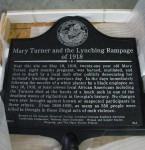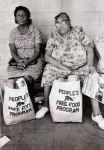Criminalizing Human Rights Work: Assata and the Incarceration of Black Women
By Meron Wondwosen
In 1918, one year shy of turning 20 and eight months pregnant, Mary Turner was terrorized by a white lynch mob who hung her upside down, shot her, set her on fire, cut out her fetus, and stomped her baby to death. This Black woman’s crime was speaking out against the mob that lynched her husband. In an act of self-determination and resistance, she declared that she would press charges against those who murdered her husband. In essence, she was murdered for asserting the human rights and dignities of her husband and more broadly of African people. It is reported that the white people of Brooks County, Georgia, who engaged in this unspeakable crime against humanity did so because they “took exception to her remarks and her attitude.”[1] Mary Turner had dared to challenge the genocide of Africans and the price was her death.
Imagine experiencing such rage at a grieving woman’s “attitude” and her “remarks” that your response is to silence her through murder. Following Mary Turner’s lynching, a conspiracy of silence among the white community almost buried her story—thereby silencing not only Mary Turner but also her act of resistance and the resulting murder.
There is little room in America for acts of resistance by Black women. White supremacy has always taken exception to Africans defending their human rights. The response has been silencing through murder, exile, or imprisonment. Like the citizens of Brooks County, Georgia, there is still a level of rage directed at Black women who assert and fight for their human rights. In that regard, Assata Shakur’s case is incredibly instructive. To silence her, the power structure attempted to murder her by shooting her and imprisoned her, and, following her escape from prison, she remains in exile in Cuba. Her actions, which resulted in these series of events, are also instructive and from the point of view of the government, they serve as a cautionary tale for future “Assatas.” She is a woman whose work was primarily directed at challenging systems that barred full access to the human rights of Africans. Whether it was free breakfast programs, free health clinics, or free legal clinics, Assata and the social justice advocates in the Black Panther Party were engaged in critical human rights work. It is for these activities that she continues to be a marked woman, some thirty years after her liberation from prison. We may forget the history of the Black Panther Party and the heroics of those men and women, but white supremacy never does. Through institutional powers such as the police and the prison system, white supremacist ideology serves to remind us that Black women asserting their fundamental human rights are a threat.
This white supremacist ideology is insidious because while the ideas and activities Black people conduct on behalf of their community is criminalized, those same ideas are stolen and repackaged to benefit other communities. We would do well to remember that it was the Black Panther Party which first created the free breakfast program for children—no such national program existed. The response of the United States government was to criminalize the Black Panther Party, murder, imprison, and exile its members, while stealing and adopting the free breakfast program.
One sees a similar dynamic in the re-segregation of schools where education resources are protected and made exclusive for white children. Conversely structural impediments to quality education for Black children are created. To date, at least three Black women have been charged with theft of educational services for sending their children to whiter, wealthier school districts. Money and resources are used to prosecute these Black mothers instead of addressing the real issue: the desperation felt by these women who know that sending their children to the substandard neighborhood schools will only keep their children mired in poverty. One of the women arrested was homeless and seemingly without means, yet she knew enough to try to change the educational circumstances of her children. For this act, which is in reality an act in defiance of unjust educational laws and policies, these Black mothers are criminalized.
What the mothers did in these cases is in line with what the Panthers and Assata fought for: basic tenets of human rights for Africans. It is also in line with what Black women have always done: struggle, fight, and work to educate their children because they understand the pivotal role that education can play in their children’s future. These Black mothers are presented as threats to an educational system that has been reordered to provide the best education allegedly not based on race but rather one based ostensibly on wealth—yet we know in this country that wealth is tied to race. Any efforts to subvert this structural barrier—which excludes poor Black children—are punished. So while these Black mothers did what millions of other Black parents do—send their children to schools that give them a fighting chance, for their pursuit of an internationally recognized human right—education—they are criminalized.
This nation’s rush to incarcerate has become increasingly pronounced in the case of Black women. And yet it is still daunting to think that a Black woman would receive a mandatory 20-year sentence for self-defense. This is the case of Marissa Alexander—a mother and survivor of domestic violence—who fired a warning shot at a wall in her house when her abusive husband threatened her. While the husband was not injured, Marissa has become a part of the most rapidly increasing population in prison—Black women. Marissa’s case is particularly chilling because it intersects intimate partner violence and state-sponsored violence. As a nation, we are not concerned about state-sponsored violence—particularly the prison industrial complex. As the Black community, while we clamor (and rightfully so) to hit the streets, the courts, and the legislative corridors to challenge police violence, we have yet to provide an adequate response to intimate partner violence that doesn’t involve the police. In this regard, our analysis of violence that specifically targets Black women must be more sophisticated. In the absence of any alternatives that address these issues, Marissa defended herself and her children using the means available to her. The result is her conviction and incarceration.
In the context of these continuing attacks on Black women and their skyrocketing incarceration rates, Assata’s survival and her escape from prison is an affront to white supremacy. That is why such extensive state powers are amassed against her. The continued hunt for Assata is rooted in her supposed crime as much as in her escape from prison. Her case contributes to the idea of Black women as threats because, despite her physical absence from the United States, as her increased bounty indicates, she is never far from the minds of the New Jersey police and the FBI. In this regard, the white power structure cannot abide by a woman whose very freedom is an act of resistance. Like Mary Tuner’s defiance, Assata’s unapologetic critique of structural racism in the United States, as well as her continued freedom, challenges conventional wisdom about resistance.
Imprisonment aims to silence the voices of Black women and reduce their important survival work to mere crimes. The response to this continuing crisis of incarceration has to be vigilant and it must amplify the critical voices and ideas of Black women. Since white supremacy takes exception to Africans defending their human rights, we must support Black women who face down oppression and acknowledge their work. In that vein, hands off Assata!
[1] http://www.thefreelibrary.com/%22The+people+…+took+exception+to+her+remarks%22%3A+Meta+Warrick+Fuller,…-a0201711268
_________________
Born in Ethiopia, Meron Wondwosen was raised in Africa and Europe, prior to immigrating to the United States at the age of 13. She has practiced law in a range of areas including corporate finance and securities, banking, voting, and international human rights. Meron was also a co-coordinator of the Black August Hip-Hop Project, an international artist and activist collaborative that focuses on the link between human rights and hip-hop. Meron has authored and co-authored several reports submitted to the United Nations on the state of human rights in the United States and Ethiopia. She is also the author of an unpublished manuscript on her adventures as a Black lawyer girl on Wall Street. Meron is a mother, wife, feminist, and a fourth generation tej brewer.

4 Comments